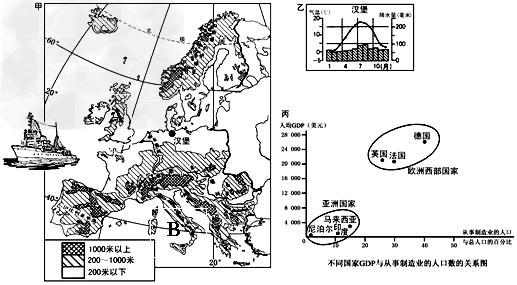问题
综合
读欧洲西部图,回答下列问题:

(1)从甲图可看出,欧洲西部除南北两侧有山地分布外,广大的中部,地形 __以为主,这种地形对气候的影响是__________________________。
(2)乙图基本反映了欧洲西部主要气候类型的特点。请你简要描述其特点: 。
(3)丙图反映出欧洲西部国家 业发达。
(4)来往欧洲西部和撒哈拉以南非洲的货船,一般情况下到非洲去的货船装载的货物主要是工业制成品,而返航时装载的货物以 为主。
(5)A地区当地居民餐桌上多见牛排、奶油、奶酪等食品,原因是 ;B是 海,沿岸地区园艺业发达,盛产水果的自然条件是 。
答案
(1)平原;利于海上湿润气流深入内陆
(2)终年温和多雨
(3)制造(工)
(4)矿产、农产品等初级产品
(5)草原广阔,畜牧业发达;地中;夏季炎热干燥,冬季温和多雨
